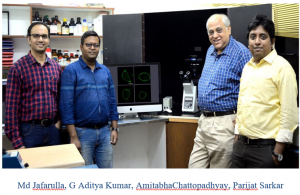Molecular Sensor on Serotonin Receptor to Detect Cholesterol
New Delhi, July 28th (India Science Wire): Cells communicate with each other via receptor proteins expressed on the cell membranes. Many drugs target these receptor proteins to alter cell’s functioning and physiology. However, the latest study from Prof Amitabha Chattopadhyay’s lab at CSIR-Centre for Cellular and Molecular Biology (CCMB) makes a case for accounting for the lipid environment that surrounds the receptor proteins, while designing drugs acting on the latter.
expressed on the cell membranes. Many drugs target these receptor proteins to alter cell’s functioning and physiology. However, the latest study from Prof Amitabha Chattopadhyay’s lab at CSIR-Centre for Cellular and Molecular Biology (CCMB) makes a case for accounting for the lipid environment that surrounds the receptor proteins, while designing drugs acting on the latter.
The lab had earlier found that the serotonin receptors are sensitive to cholesterol surrounding them. In the new study published in Science Advances, they report a sensor region on human serotonin1A receptor that can detect cholesterol. They looked at specific regions called CRAC motifs in the receptor. These are believed to interact with cholesterol. The researchers carefully replaced specific amino acids in the CRAC motifs of the serotonin1A receptor and identified a particular amino acid responsible for the cholesterol-sensitive function of the receptor.
Also Read : International Study Offers New Insights into Star Formation in Milky Way
The researchers collaborated with Dr Jana Selent’s group from Pompeu Fabra University Hospital del Mar Medical Research Institute in Barcelona, Spain to visualize the protein-cholesterol interactionvia computer-aided molecular dynamics simulations. This helped thempredict how thespecific amino acid on CRAC motif enables the receptor to sense changes in cholesterol levels by controlling molecular motion in certain regions of the receptor, says CSIR-CCMB statement.
“These findings are important since cholesterol levels change in our cells with age and in many disease conditions. We believe our work will help in developing better drugs that keep in mind not just the receptor as the drug target, but also the lipid environment in which the receptor is present”, explained Prof Chattopadhyay.
“Our expertise in structural biology at CCMB is key towards a physical understanding of cells and their functions. This not only adds to the detailed view of living cells but also have immense potential in therapeutics development”, said Dr Vinay Nandicoori, Director, CCMB. (India Science Wire)
